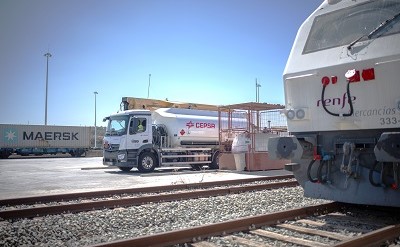- This pioneer initiative in Spain has enabled the transport of more than 4,700 containers using renewable diesel, avoiding the emission of nearly 500 tons of CO2
- The results of the test were highly satisfactory, demonstrating optimum engine performance. Renfe, Maersk, and Cepsa are analyzing the possibility of continuing to use renewable fuels along this route and even extending them to other non-electrified routes
- For more than three months, the companies tested this renewable fuel produced from used cooking oils on the Algeciras-Cordoba route, part of the Algeciras-Madrid route, which is not fully electrified
- Second-generation biofuels, produced by Cepsa at its energy park in La Rábida (Huelva), promote the circular economy and reduce CO2 emissions by up to 90% compared with traditional fuels
This pilot has obtained very satisfactory results, demonstrating optimum engine performance. As a result Cepsa, Maersk, and Renfe are analyzing the possibility of continuing to cover this route with renewable diesel and even extending it to other non-electrified routes.
This second-generation biofuel, which replaced the conventional diesel used in Renfe’s locomotives, was produced at Cepsa’s La Rábida Energy Park (Huelva) from used cooking oils. This type of renewable fuel can be used in engines without the need for engine modifications, and during its entire life cycle (from production to use), it reduces CO2emissions by up to 90% compared to traditional fuels. In addition, second-generation biofuels promote the circular economy by using waste for their production that would otherwise be discarded or end up in landfills.
Collaboration for the decarbonization of heavy transport
After successfully running various tests in air and maritime transport, and starting to sell renewable diesel at its service stations and customer facilities, this pilot initiative represents another step forward for Cepsa, which is working to decarbonize heavy transport through the production of green molecules. As established in its Positive Motion strategy, the company aims to become a benchmark in the energy transition and to lead renewable fuel production in Spain and Portugal by 2030, with an annual production capacity of 2.5 million tons.
Maersk has announced that it will achieve net zero emissions by 2040 in all business areas, such as shipping, inland and air transport, as well as inland activities such as warehousing, terminals, and other land-based services. To achieve this, Maersk has already defined ambitious short-term targets for 2030. These include a 20% reduction in GHG emissions (compared to the 2020 baseline) from its overland logistics activities, such as rail and truck transport.
Renfe Mercancías, a leading operator in sustainable mobility, continues to reinforce its corporate strategy in a clear commitment to lead the decarbonization of transport. During the past year, almost 80% of the company's total traffic was carried by "CeroCO2" electric locomotives powered by renewable energy, a proportion that is being increased thanks to the acquisition of new, more modern, safer and more efficient electric traction equipment. Renfe Mercancías has put into service this year 12 new high-power electric locomotives to operate on Iberian gauge and awarded last March the contract for the supply of another 12 international gauge electric locomotives for 136.7 million euros with an option to supply an additional 6 locomotives for freight traffic on the Mediterranean Corridor and to operate in France. The implementation of this biofuel trial will make it possible to explore sustainable alternatives for rail transport on non-electrified lines.




